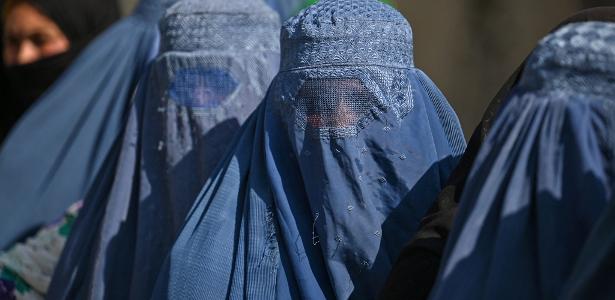
On Saturday (7), the Taliban movement took a new step in restricting the freedoms of women in Afghanistan, forcing them to wear the full veil in public, in preference to the burqa, a symbol of women’s oppression in the country.
In a decree issued to the press in Kabul, the supreme leader of the Taliban and Afghanistan, Hebatullah Akhundzadeh, ordered women to completely cover their bodies and faces when going out in public, adding that the burqa – a veil that conceals even the eyes – is the best option for this. The decree stipulates that women must wear the “chadri (another name for the burqa) because it is traditional and respectable.”
The text explains that “women who are neither young nor old should cover their faces, except for their eyes, in accordance with the recommendations of the Sharia, to avoid any provocation when they meet a man” who is not a close family member. The decree stated that if they had no reason to go out, “it is better for them to stay at home.”
Penalties of the head of the family
The document also lists the penalties for heads of families who do not impose full veiling on the women of the family.
Since the Taliban returned to power in mid-August 2021, the Ministry for the Promotion of Virtue and Prevention of Vice has issued several recommendations on how women should dress. But this is the first public notice on this subject to be enacted at the national level.
The Taliban had previously required women to wear at least the hijab, a scarf that covered the head but revealed the face, and strongly recommended the wearing of the burqa. The fundamentalists imposed the dress during their first term in power between 1996 and 2001.
In this first system, the Taliban denied women nearly all rights, according to a strict interpretation of Islamic law. Undersecretaries of the Ministry of Promotion of Virtue and Prevention of Vice suppress anyone who is arrested without a burqa.
Promises denied
In this second term, after 20 years of occupation by the United States and its allies, the Taliban promised to be more resilient. But the promise was short-lived and further disenfranchised women, who had enjoyed freedom for two decades in the country. They went back to schools and universities and were able to apply for jobs in all industries, yet Afghanistan remained socially conservative.
Now, however, women are effectively barred from working in public services and prohibited from traveling abroad or taking long trips within the country unless accompanied by a male family member.
In March, the Taliban closed schools for girls over 12, just hours after their long-announced reopening. This unexpected turn of events, which was justified by the fact that “the education of girls must be carried out in accordance with the provisions of Islamic law,” caused the scandal of the international community.
The Taliban also enforced segregation of women and men in Kabul’s public parks, with visiting days imposed for each gender.
Women even tried to claim their rights, with protests in Kabul and major Afghan cities after the Taliban returned to power. But the fundamentalists suppressed the movement, arresting many activists and holding a number of them for weeks.
The burqa is a traditional Afghan dress, which is widely worn in remote and conservative areas of the country. Even before the Taliban’s return to power, the vast majority of Afghan women wore the headscarf, but many chose to wear only the loose-fitting headscarf.
*With information from Agence France-Presse

“Proud explorer. Freelance social media expert. Problem solver. Gamer.”






